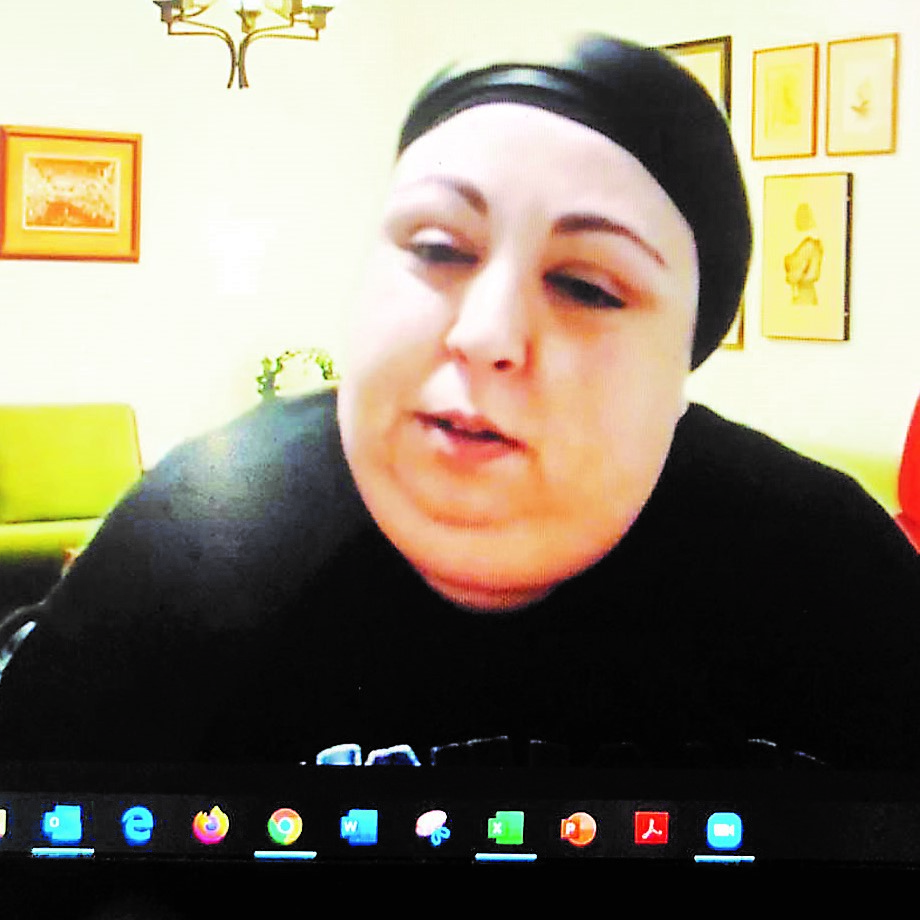click to dowload our latest edition
CLICK HERE TO SUBSCRIBE TO OUR NEWSLETTER


Published
4 years agoon
By
adminSTEVEN GRUZD
Maya spoke to a packed online Zoom event hosted by Sydenham Shul and Yad L’Achim (A hand to the brothers), founded in 1950 to bring lost Jews back into the fold.
At 14, Maya’s Jewish mother fell in love with an Arab man and went to live in his village. She had a son with this man, then ran away to Jerusalem, but her family rejected her.
“She lived on the streets. She became a drug addict. My brother was taken away by social workers. Then she fell in love with another Arab man, my father. I can’t explain why. He was a very wealthy and religious Muslim, a sheikh.” When Maya was born, her father chased her mother away. At the age of three, she was placed with a non-religious Jewish foster family.
“I spoke only Arabic,” Maya said. “My foster parents hated me. Again, I can’t explain why then they took me.” They wouldn’t let her sit at their table, and almost never spoke to her.
When she was 14, she wanted to meet her parents. The authorities had lost touch with her mother, who had had a daughter with yet another Muslim man. Her father came with about 80 family members to meet her. Lacking love elsewhere, she decided to return to his village.
“It was the first time I felt that I belonged,” Maya recalled. She learned the Qur’an with a private teacher daily. “My father gathered all the men and told them to be patient with my mistakes – I made many – and I guess I was happy. I wasn’t treated badly.
“I met [Palestine Liberation Organization Chairman Yasser] Arafat a few times with my father,” she said. To impress him, she told Arafat that if she saw Israeli soldiers, she would throw stones at them. Her father was very proud of this response. “This was the spirit of the family.”
She was married off to a 22-year-old when she was just 15. “The women told me how thankful I should be as the first wife to a young man. I could have been the fourth wife to an old man.”
Things soon turned sour. Her husband beat her mercilessly for every mistake, which included dinner being late, the house not being clean enough, or spending too long at the supermarket. “The Qur’an teaches that women should accept punishment as something for their own good,” Maya said. “I truly believed it was OK, that he was teaching me, and I should thank him.”
At 16, she was six months pregnant. One night she was worried as it was late and her husband hadn’t returned from work. With no phone, she quickly ran to her grandparents’ house to use theirs. She had committed an unforgiveable transgression – leaving her house at night without her husband’s permission.
“My husband dragged me into the street by my hair, and beat me in public. He broke bones, and I started bleeding,” Maya said. She begged to be taken to hospital, but her husband said he wanted to teach her the lesson of patience. It wasn’t until the next morning that she was hospitalised. He threatened to kill her unless she told doctors she’d fallen down the stairs. She lost the baby.
A kind uncle reluctantly agreed to help her escape when she turned 17. On the way to a shopping expedition in Jerusalem, Maya jumped off the bus, and ran to some Israeli soldiers. The uncle feigned anger and chased her.
She started living rough, sleeping in the streets, and in gardens. She stole food and clothes from washing lines. She eventually found her mother, who closed the door in her face, saying that she had suffered enough without her daughter adding to it.
At age 18, a social worker managed to get her into an establishment for the homeless. A boy in the next room convinced her to come to the Kotel on Yom Kippur. She sat there for hours, thinking how her father had made her pray in a mosque five minutes away on Har HaBayit (the Temple Mount). She had an epiphany, thanking G-d for her second chance at life.
She began to learn Torah, became more religious, and got back on her feet.
By chance, she met a friend from the streets, with an Arab boyfriend. Maya had told no-one about her background. “When they asked, I said, ‘I have no parents and no questions. That’s it.’” But she told her story to her friend, who was shocked and broke off her relationship. “I was happy that I had saved her and possibly her children. But I was sad too, because I thought what would have happened if someone had convinced my mother at 14, how different my life could have been.”
Maya realised that helping trapped women was her life’s mission. She found Yad L’Achim, and has since helped to contact and rescue scores of Jewish women and children from Arab villages. “I know I’m taking a risk, but I’m also saving lives,” Maya said. She was able to rescue her 10-year-old sister, and raised her as her own daughter. Today, Maya is married with three children.
A few years ago, she bumped into her father unexpectedly. He was pleased she was dressed modestly. He also said her Arab husband would seek revenge for being dishonoured.
“Not all Arabs are abusers, but all of them control their women,” Maya said.
Yossi Eilav from Yad L’Achim said they have more than 10 000 cases on file, and have rescued more than 550 Jewish women and children from all Jewish backgrounds in Israel in the past year.
